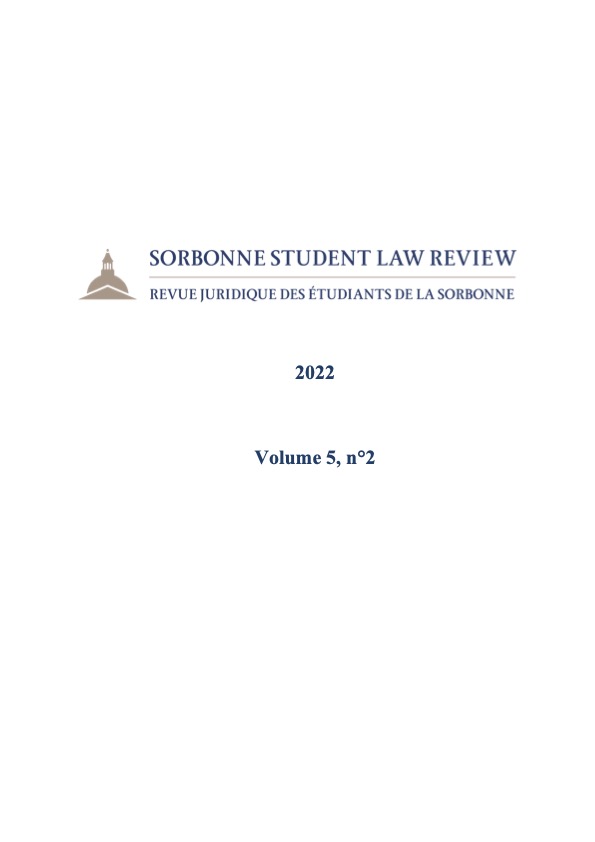Résumé
À l’heure du bilan de l’année 2022, force est de constater qu’elle fut d’une richesse rare en termes d’actualités juridiques, et il apparaît difficile d’en détacher les éléments les plus marquants. D’un côté, des évènements bouleversants et – nous l’espérions – fulgurants semblent progressivement s’inscrire dans une nouvelle forme de normalité. Ainsi de l’invasion de l’Ukraine par la Russie. De l’autre côté, des évènements que l’on pensait relativement éloignés de nos préoccupations européennes, finissent pourtant par éclabousser nos démocraties. Ainsi du « Qatargate », qui révèle un système de corruption tentaculaire, s’étendant jusqu’aux membres du Parlement européen.
Bien sûr, comme souvent, de tels chocs peuvent permettre d’impulser un sursaut, et d’éveiller soudain les consciences. À peine remis de l’onde de choc causée par la remise en question du droit à l’avortement aux États-Unis, c’est au tour des femmes iraniennes de se soulever pour la défense de leurs libertés, au péril de leur vie. Ces évènements posent la question de la protection de ces acquis fondamentaux par le droit. En France, la réponse fut celle de l’inscription du droit à l’avortement dans la Constitution[1]. Mais les outils juridiques permettant de garantir le respect des droits individuels à toutes les échelles sont d’une grande variété.
C’est cette variété que nous avons interrogé à l’occasion de la conférence de rentrée, portant sur « L’urgence et le droit », organisée début septembre par la Revue juridique des étudiants de la Sorbonne. Ce fut l’occasion d’échanger entre jeunes chercheurs sur les outils juridiques prévus par les différentes branches du droit et leur adaptabilité face à l’urgence d’enjeux aussi bien nationaux que mondiaux. Bien que les retranscriptions ne se trouvent pas dans ce numéro – il faudra pour cela attendre notre prochaine publication -, les contributions faites par nos auteurs ce semestre donnent quelques pistes en lien avec ce sujet, et mettent en lumière la flexibilité des mécanismes juridiques, qui trouvent des applications variées et parfois imprévues.
Ainsi, Anastasios Lafaras aborde l’opportunité de mettre un mode de règlement des différends privé – l’arbitrage commercial – au service de l’intérêt général, notamment lorsque des impératifs d’efficacité le commandent. C’est ainsi qu’il est désormais permis aux tribunaux arbitraux de se prononcer sur des questions relevant du droit de la concurrence (« La place de l’arbitrage dans l’indemnisation des pratiques anticoncurrentielles »). De la même manière, Clara Grudler évoque la souplesse du droit de l’Union européenne et sa perméabilité vis-à-vis du droit international, par la mise en place d’un dialogue inter-institutionnel visant à résoudre la question de la protection des biens culturels au sein du marché intérieur (« La circulation des biens culturels dans l’Union européenne entre contestation et encadrement »). À l’inverse, Andrea Valentina Dias Bolivar démontre la manière dont des instruments de pression économique permettant aux pays développés d’impulser des changements auprès d’États moins puissants peuvent faire l’objet d’usages dévoyés, et servir un objectif de coercition politique (« The U.S. unilateral coercive measures imposed in Latin America. A study based on the experience of Cuba, Nicaragua, and Venezuela »).
In fine, si la souplesse des instruments juridiques ressort de façon unanime de ces trois contributions, leur déformation apparaît comme un dangereux revers de la médaille. Il ne reste donc qu’à souhaiter pour 2023 de meilleurs usages ... Je profite de ces dernières lignes pour remercier nos trois contributrices et contributeurs, ainsi que l’ensemble des membres du comité de lecture, sans qui cette publication n’existerait pas. Je remercie enfin l’ensemble des éditeurs de la Revue pour leur travail, et vous souhaite à toutes et à tous d’excellentes fêtes de fin d’année.
Anne-Charlotte Cervello
Rédactrice en chef – Doctorante à l’École de droit de la Sorbonne
[1] Proposition de loi constitutionnelle adoptée par l’Assemblée nationale visant à protéger et à garantir le droit fondamental à l’interruption volontaire de grossesse, 24 novembre 2022.

Ce travail est disponible sous la licence Creative Commons Attribution 4.0 International .
(c) Tous droits réservés Sorbonne Student Law Review - Revue juridique des étudiants de la Sorbonne 2022

